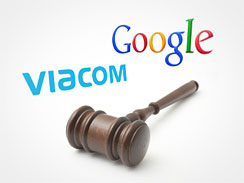Viacom is appealing the decision of the New York Federal Court which granted Google’s (YouTube) motion for summary judgment that it was protected against claims of copyright infringement for videos uploaded to YouTube by the Digital Millennium Copyright Act’s safe harbor provisions. Viacom believes that Google is not entitled to the safe harbo r shield due to Google’s so-called “intentional exploitation” of thousands of Viacom’s copyrighted works. Google believes that it is entitled to the safe harbor since it took down the copyrighted files when properly notified of their unauthorized postings. Interestingly, Viacom has apparently hired Ted Olson, of Bush v. Gore and the challenge to California’s Proposition 8 fame, to represent it on appeal.
r shield due to Google’s so-called “intentional exploitation” of thousands of Viacom’s copyrighted works. Google believes that it is entitled to the safe harbor since it took down the copyrighted files when properly notified of their unauthorized postings. Interestingly, Viacom has apparently hired Ted Olson, of Bush v. Gore and the challenge to California’s Proposition 8 fame, to represent it on appeal.
Articles Posted in DMCA
Google Saved Again By DMCA – Im”Perfect” Notices Do Not Establish Actual Notice
 A federal court dismissed on summary judgment most of the copyright infringement claims against Google, ruling, in part, that Plaintiff’s notices were not compliant with the requirements of the Digital Millennium Copyright Act (“DMCA”). As a result, the court found that Google was entitled to “safe harbor” protection under various sections of the DMCA.
A federal court dismissed on summary judgment most of the copyright infringement claims against Google, ruling, in part, that Plaintiff’s notices were not compliant with the requirements of the Digital Millennium Copyright Act (“DMCA”). As a result, the court found that Google was entitled to “safe harbor” protection under various sections of the DMCA.
This is another in a string of DMCA rulings that favor online service providers, place the burden of policing infringement on content owners and demonstrate the courts’ inclination to strictly construe the DMCA requirements. We previously posted about the $1 billion damage claim that Google (and its YouTube subsidiary) avoided in its lawsuit with Viacom by reliance on the DMCA. These cases continue to highlight the business need for ensuring that companies have and comply with effective DMCA policies.
In framing some of the issues, the court stated:
In order to be eligible for any of these three safe harbors under the DMCA, a party must satisfy three threshold conditions. First, the party must be a service provider as defined under 17 U.S.C. § 512(k)(1)(B). Second, the party must have “adopted and reasonably implemented, and inform[] subscribers and account holders of the service provider’s system or network of a policy that provides for the termination in appropriate circumstances of subscribers and account holders of the service provider’s system or network who are repeat infringers.” 17 U.S.C. § 512(i)(1). Third, the party must “accommodate[] and . . . not interfere with standard technical measures” used by copyright owners to identify or protect copyrighted works. 17 U.S.C. §§ 512(i)(1)-(2).
The court found that Perfect 10 did not dispute that Google met the first and third prongs, but rather it argued that there were issues about whether Google implemented a suitable policy for repeat infringers. But for some of the technologies at issue (e.g., Google’s Web Search, Image Search and caching feature”), Google does not have account holders or subscribers. Even Perfect 10 did not contend that Google must, or even can, have a repeat infringer policy for those services. See 17 U.S.C. § 512(i)(1)(A) (requiring a repeat infringer policy for those services with “subscribers and account holders”). Thus, the court summarily found in Google’s favor on these issues.
The court also addressed issues relating to the “Information Location Tools” safe harbor under Section 512(d) of the DMCA. Here the court found that Google, in many cases, did not have “actual notice” of infringement, despite receiving numerous notices from Perfect 10. The court stated:
As the Ninth Circuit explained in CCBill, “The DMCA notification procedures place the burden of policing copyright infringement–identifying the potentially infringing material and adequately documenting infringement–squarely on the owners of the copyright.” CCBill, 488 F.3d at 1113. P10’s Group C notices do not “identif[y] . . . the copyrighted work claimed to have been infringed . . . .” 17 U.S.C. § 512(c)(3). To refer Google to more than 15,000 images appearing on the entirety of P10’s website falls far short of identifying what may have been infringed. Nor is a reference to the totality of the P10 image collection “a representative list” of “multiple copyrighted works” appearing without authorization at a single infringing site. See 17 U.S.C. § 512(c)(3). Thus, all of P10’s Group C notices lack the identification of the copyrighted work required by section 512(c)(3)(A)(ii).
P10’s Group C notices are additionally defective because they do not contain all of the required information in a single written communication.
The court also addressed the Safe Harbor for caching under Section 512(b) of the DMCA and various other issues.
The case is Perfect 10, Inc. v. Google, Inc. Here is a copy of the Decision
Boomshine Boomerangs (Part II) – Court Allows Copyright Complaint Against Facebook to Continue
On July 23, 2010, Judge William Alsup of the U.S. District Court for the Northern District of California entered an order denying Facebook Inc.’s motion to dismiss a second amended complaint alleging that Facebook is guilty of contributing to the copyright infringement of a video game. Judge Alsup denied Facebook’s argument that, as the Plaintiff had failed to properly allege direct infringement by its Co-Defendant, no claim against Facebook for contributory infringement could be made. A copy of the decision can be found here: Miller v Facebook
Background
The pleadings allege that Plaintiff, Daniel Miller, created the video game Boomshine in 2007 and was granted a copyright registration by the U.S. Copyright Office. Boomshine is a game in which players click on floating circles which cause them to expand resulting in the expansion of any other circles which come into contact. Miller’s second amended complaint accuses Defendant,Yao Wei Yeo, of direct infringement by arguing a similar “look and feel” between his video game, ChainRxn, and Boomshine but provides no further evidence of copying. According to the allegations in Miller’s filings, “ChainRxn copies the look and feel of Boomshine by incorporating almost every visual element of the game”. Moreover, the second amended complaint accuses Facebook of contributing to the infringement of the video game by allowing Yeo’s game to remain on its website after being notified that it infringed the copyright of Boomshine. Miller alleges that “[a]fter defendant Yeo published ChainRxn on defendant Facebook’s website, members of the public were deceived regarding the origin of ChainRxn.”
The Court’s Denial
Facebook filed a motion for dismissal of the suit on June 21, 2010. Its argument was founded on the position that, as Miller had not properly first pled direct infringement by Yeo, he could not sustain a claim for contributory infringement by Facebook. The basis for Facebook’s argument was that Miller’s mere allegation that ChainRxn “looks and feels” identical to Boomshine without further proof of copying was insufficient to allege direct copyright infringement of Boomshine’s source code. Moreover, Facebook argued that the copyright registration Miller had obtained for the source code was limited to its literal elements and not audiovisual elements of Boomshine. Judge Alsup denied the first element of Facebook’s motion as premature noting that a “plaintiff can rarely examine the underlying source code of an accused infringing software program without resorting to discovery.” Specifically, Judge Alsup said it would be “unreasonable, if not impossible” for Miller to know with “exacting detail” how Yeo copied the Boomshine source code so early in the case. Additionally, Judge Alsup denied the second portion of Facebook’s motion by clarifying that the Court’s earlier order “did not hold that copyright protection for source code was limited to the literal elements of the work” but rather that “plaintiff’s copyright appears to be limited to the source code rather than the audiovisual aspects” and further determination is necessary to decide if the audiovisual elements of the game were also protected.
Finally, the court reminded Miller to address the disputed service of the second amended complaint on Yeo by the July 30, 2010 deadline or suffer a “potentially fatal defect” to his case.
Comments
The above action is interesting for several reasons. Platform companies like Facebook generally rely on the “safe harbor” protections the Digital Millennium Copyright Act provides when an infringement claim is made for the postings of a third-party. In fact,YouTube recently obtained a favorable decision providing it with DMCA protection in a potentially billion-dollar copyright infringement suit brought by Viacom. Moreover, while the Courts may differ on copyright protection for audiovisual “screen displays” in video games, the Copyright office’s consistent position is that “a single registration is sufficient to protect the copyright in a computer program and related screen displays, including videogames, without a separate registration for the screen displays or a specific reference to them on the application for the computer program.” For further discussion you can review the Copyright office’s Circular 61
That said, this case continues to demonstrate that social networking platforms and other websites displaying user generated content must be ever vigilant or potentially face suits arguing various copyright theories. As technology advances (as well as the means of infringement) it is likely the pleading requirements will remain relatively low and defer the need to demonstrate the how, when and why of the alleged infringement until the completion of discovery. Since this will likely increase the cost of litigating these matters, Platform operators and creators of user generated content need to understand and avail themselves of copyright (and other IP) protection, enforcement techniques and available defenses.
Criminal Liability for Not Reading or Abiding by Terms of Service?
Many people routinely click on the Agree button without reading the terms of service. Doing so can be perilous for many reasons. A pending case highlights another potential reason to read and abide by the terms of service – potential criminal liability. Granted, there are some unique facts here as discussed below, but it is to everyone’s benefits to read and understand terms of service. For example, for users of a social media site, it is crazy to not understand what personal data is being collected and how it is being used and make an informed decision whether to use that site. For businesses (and investors in businesses) that interact with social media sites, it is critical that you understand and abide by the terms of service to assess whether your business model is “legal” and in compliance with the relevant terms of service. If not, your business (or investment) may be in peril, and in a worst case scenario you may face personal liability. Such was the case for the CEO of MDY when it created a tool that engaged in unauthorized access to Blizzard’s World of Warcraft client software in violation of the relevant terms of service and EULA. In addition to the company being found to infringe, the CEO was held personally liable for $6 million in damages.
In a pending case, Facebook v. Power Ventures dba/Power.com, Facebook is relying on its terms of service and the Computer Fraud and Abuse Act and an analogous provision of the California Penal Code to prevent Power.com from using automated tools to populate a portal that aggregates a user’s social networking profiles. This is deemed beneficial by many users, but not by Facebook. In its complaint, Facebook alleges that it grants a limited license to create applications that interact with Facebook’s proprietary network subject to various terms of use agreements which prohibit, among other things, requesting, soliciting, or otherwise obtaining access to user names, passwords or other authentication credentials.
Facebook alleges that Power.com induces visitors to surrender their Facebook user names and passwords in order to “integrate” their Facebook account into the Power.com website, in violation of the Facebook’s terms of service.
After notification from Facebook. Power.com allegedly initially agreed to cease the activity and purge the “ill-gotten data,” but apparently later changed its mind and continued its practices. In response, Facebook claims to have implemented technical measures to block access to the site by Power.com but Power.com then allegedly circumvented the technological security measures without authorization in violation of the Computer Fraud and Abuse Act. Facebook also alleged violation of CALIFORNIA PENAL CODE 502(c), the “COMPREHENSIVE COMPUTER DATA ACCESS AND FRAUD ACT” (including Sections 1-4 and 7) and the anti-circumvention provisions of the DMCA, among other claims.
Additionally, Facebook alleges that Power.com used the names to send unsolicited email messages to Facebook users that contained false header information in violation of the CAN-SPAM (CONTROLLING THE ASSAULT OF NON-SOLICITED PORNOGRAPHY AND MARKETING) Act.
Even though this is a civil action the penalties that can flow from a finding of violation of the Computer Fraud and Abuse Act include: (A) a fine or imprisonment for not more than ten years, or both (for a first conviction) and (B) a fine under or imprisonment for not more than twenty years, or both, in the case of a repeat offender. Violation of the relevant sections of the California Penal Code can result in fines and imprisonment up to three years.
The Electronic Frontier Foundation filed an amicus brief in support of Power Ventures; arguing:
Facebook argues that by offering these enhanced services to users, Power violated California’s computer crime law. It grounds its claim in the fact that Facebook’s terms of service prohibit a user from having automated access to a user’s own information and that Power continued to offer the service to Facebook users even after Facebook sent Power a cease and desist letter demanding that it stop. Yet merely providing a technology to assist a user in accessing his or her own data in a novel manner cannot and should not form the basis for criminal liability.
Many commenters have pointed out that taken to an extreme, any online service provider can create ridiculous terms of service and allege that there is a violation. While this may theoretically be true, in reality a court could strike down a frivolous clause if that were the case. However, when a company has a legitimate business interest to protect, and the terms of service relate to that business interest, an argument can be made that such terms should be upheld. Here Facebook appears to be alleging that it has a legitimate right to prevent third party application developers from requesting, soliciting, or otherwise obtaining access to user names, passwords or other authentication credentials. Perhaps this case will shed some light on this issue. Check back as we will provide updates on this case as it progresses.
Google Prevails in DMCA Safe Harbor Dispute
Google has prevailed on summary judgment in a lawsuit brought against it by Viacom for widespread copyright infringement due to uploading of copyrighted content to its YouTube site. Viacom was seeking $1billion in damages, alleging that Google was aware that users were committing copyright infringement by uploading songs and other content to YouTube and that Google was permitting this to happen. The Judge sided with Google finding that it was protected under the “safe harbor” provisions of the Digital Millennium Copyright Act (DMCA). Viacom has vowed to appeal.
The safe harbor provisions of the DMCA provide a significant shield from liability for online service providers, such as Google, when users post infringing content to their site However, to qualify for this safe harbor, the online service provider must have an effective policy and must comply with any proper DMCA take down notice. Other requirements must also be met.
Many companies are generally aware of the DMCA but some do not comply with all of the steps necessary to benefit from the safe harbor due to a lack of complete understanding of these requirements. If you are an online service provider and allow users to post content to your site, you should consult with an attorney knowledgeable of the DMCA to ensure you qualify for the safe harbor provisions. A copy of the decision is here: Google Decision
 Internet & Social Media Law Blog
Internet & Social Media Law Blog




